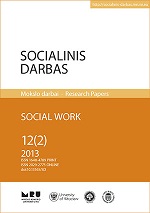Vyresnio amžiaus žmonių požiūris į kohabitaciją
Attitude of Older Persons Towards Cohabitation
Author(s): Gediminas NavaitisSubject(s): Social Sciences
Published by: Mykolas Romeris University
Keywords: cohabitation; qualitative research strategy; attitudes towards cohabitation; older age
Summary/Abstract: The current stage of the development of Lithuanian entry into force of a family social institution is characterized by the development of cohabitation. These changes are attracted to the determinants of research that usually are dedicated for macro phenomena cognition. It is equally important to learn about the valuable self-determinations encouraged by these changes. Some studies dedicated to the cohabitation revealed that young people more positively evaluate and often choose this type of man and woman relationship. However, for a more comprehensive knowledge of cohabitation, it is useful to study groups, which support of cohabitation is relatively inferior. Therefore, the article raises the problem question: What might be the reasons of cohabitation in older age? The research object is the older couples, who are in the cohabitation relations, although they have an opportunity to get married. The researched people were the clients of psychological consultation company JSC “Santuoka” and for them getting in a relationship with a potential marriage partner was the relevant task during the research. In order to get to know their attitudes towards cohabitation, qualitative research strategy and semi-structured interview method were selected. 9 women and 8 men over the age of forty were interviewed. The study took place in 2012. The research results provided a more comprehensive understanding of the cohabitation causes. It was stated that the informants could be guided by a unique concept of closeness, which was combined of three steps: binding relationship between man and woman, at least in part binding relationship (cohabitation), and marriage. Accordingly, the requirements/wishes for partner’s characteristics, status, perspective of the relations, etc. were identified. These requirements were lower if the relationship was perceived as cohabitation and higher if they were thought of as marriage. In many cases, the status of a married person has not been the general motive for marriage. Such a reason could be some type of a marriage (marriage with a social status person, marriage with a social status and wealthy person, the person who acts in the researched person’s children education, etc.). This motive was perhaps even stronger than the marriage with a specific person. The study also revealed that the informants had a typical egocentric attitude towards cohabitation and marriage, a man and woman relationship was perceived primarily as a way to meet the person’s needs. Therefore, it is quite possible to assume that the lack of empathic ability to take into account partner’s feelings and needs can be one of the factors contributing to the cohabitation.
Journal: Socialinis darbas
- Issue Year: 12/2013
- Issue No: 2
- Page Range: 353-362
- Page Count: 10
- Language: Lithuanian

